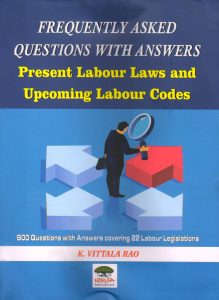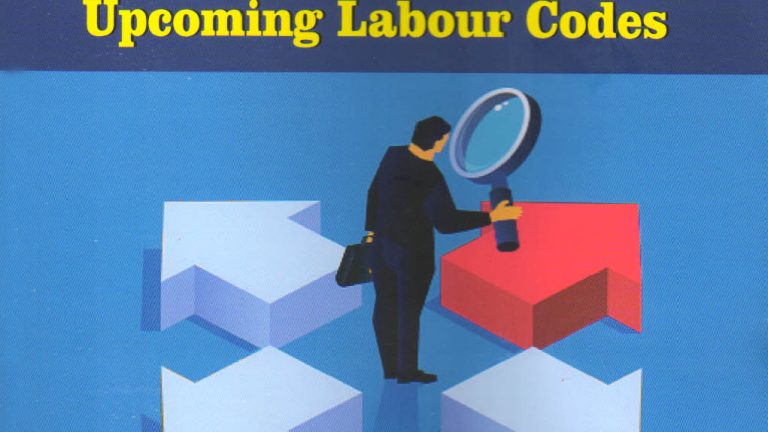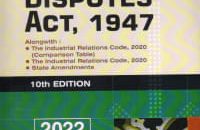
While I was flipping through the pages of the book “Frequently Asked Questions With Answers: Present Labour Laws and Upcoming Labour Codes” written by Hon’ble K Vittala Rao a significant recent experience cropped up in my mind and I take liberty to share the same. A few months ago, while checking the syllabus of a 2 years postgraduate HR (Major) program of a renowned institution I could not figure out any courseware for the students on the labour laws. When I enquired, the very closely connected interfacing HR Professor told me that they did not have any module on labour laws as students are not interested on them. Without getting into a debate about whether the institution is right by accommodating the student’s choice on the courseware, being a stakeholder; I could not resist myself and asked the Professor that what the babies are going to do in corporates? Would they go to train people, or remain busy with recruitment calls or would engage only with lip services? The Professor appreciating my viewpoint humbly replied, “It is utmost important for budding HR managers to have working knowledge of labour Laws, else the legal framework of the HR system could not be understood, and the budding HR managers shall have serious repercussions in their careers”.
Also read: We continue to expect the unexpected
It is important to create interest with a reader-friendly courseware lucid interactive style, especially when we intend to induce new skills for managers handling IR domain of HR and wish to have a long rewarding career. I thought the handbook written by Sri Rao on the referred subject is best positioned to cater the needs. This is the need of the time when with the growing width of knowledge, the student communities often are exposed to lack in creating depth. The knowledge of labour legislations is a must for understanding the governing ecosystem of HR in India.
So far, the book is concerned there are 23 (twenty-three) chapters covering various aspects of the labour legislations of India. Sri Rao being a very senior Legal and Management Consultant from the industry planned the book meticulously. To impress upon the legal ecosystem at the very beginning he kept spaces for the Constitution of India, emergence of labour laws from constitutions and Protection of Human Rights Act in questions and answers (Q&A) form. These early pages are helpful to understand the legal ecosystem of HR of the country. Subsequently, in the book 16 (sixteen) numbers of labour legislations of regular use by the HR managers at their workplace are covered in Q&A forms; the uniqueness of the book lies therein. While the questions were dealt under the individual conventional legislations the answers were parallelly dealt within the 4 (four) labour codes i.e. Code on Wages, 2019; Industrial Relations Code, 2020; the Code on Social Security, 2020; and the Occupation Safety, Health and Working Conditions Code, 2020. This uniqueness of the book (comparative presentations of 16 out of 29 employment related acts subsumed in 4 labour codes) is very helpful for the HR manager to appreciate the differences and similarities out of the reforms and keep themselves prepared for practice at field when the related regulations come into force, by the respective States.
The 2 (two) out of last 4 (four) chapters are on contemporary Sexual Harassment of Women at Workplaces [Prevention, Prohibition & Regulation] Act, 2013 and The Rights of Persons with Disabilities Act, 2016. The trend of fixed-term employment is growing in numbers in the corporate and a dedicated chapter on The Indian Contract Act 1872 referencing employment contracts & enforceability is definitely a value addition for the practicing manager. The last chapter on “Management of Discipline” is going to offer insights of intricacies in handling employment relations space. The enquiry officers under departmental enquiries are quasi-judicial authority and a stock of 50 (fifty) numbers of Q&A on the last chapter is definitely able to clear ambiguity on many situations that cropped up while one is handling such critical role and avoid embarrassment of corporate for procedure lapses may be at a later stage in case of any judiciary intervention.
The book carries value for money when one sees the rich content from practitioner perspective and quality of paper and print the publication is offering to the community. In order to make it a single widow of referencing handbook, in the future edition the author may consider to provide some space for the plantations labour act, 1951; the Mines act, 1952; the Dock Workers (Safety, Health and Welfare) Act, 1986; the Building & Other Construction Workers (Regulation of Employment and Conditions of Service) Act, 1996; etc in the Q&A Section, as the sectors under the governing legislations are highly labour intensive and often remotely located thus HR managers associated with these sector are having less opportunity of getting exposure to discussion and learning and some coverage shall definitely be value adding for them. A short-focused discussion on the provisions of the Shop and Establishment act deserves a dedicated chapter with the current relevancy and focus on the service sector.
Reviewed by Indranil Banerjee
Author : K. Vittala Rao
Publisher : Niruta Publications, No. 326, 2nd Floor, Opp. Canara Bank, Near Dr. AIT College, Kengunte, Mallathahalli, Bengaluru-560 056
Price : Rs. 500/-
Website: www.nirutapublications.org, www.mhrspl.com
Stay connected with us on social media platform for instant update click here to join our LinkedIn, Twitter & Facebook





































Add comment